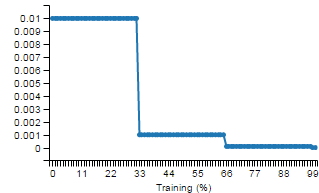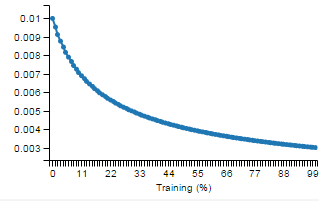2.0 KiB
description: A list of rate policies that can be used during the training of neural networks. authors: Thomas Wagenaar keywords: learning rate, policy, exponential, step, neural-network
Rate policies allow the rate to be dynamic during the training of neural networks. A few rate policies have been built-in, but it is very easy to create your own as well. A detailed description of each rate policy is given below.
You can enable a rate policy during training like this:
network.train(trainingSet, {
rate: 0.3,
ratePolicy: methods.rate.METHOD(options),
});
methods.rate.FIXED
The default rate policy. Using this policy will make your rate static (it won't change). You do not have to specify this rate policy during training per se.
methods.rate.STEP
The rate will 'step down' every n iterations.
The main usage of this policy is:
methods.rate.STEP(gamma, stepSize)
// default gamma: 0.9
// default stepSize: 100
A gamma of 0.9 means that every stepSize iterations, your current rate will
be reduced by 10%.
methods.rate.EXP
The rate will exponentially decrease.
The main usage of this policy is:
methods.rate.EXP(gamma)
// default gamma: 0.999
The rate at a certain iteration is calculated as:
rate = baseRate * Math.pow(gamma, iteration)
So a gamma of 0.999 will decrease the current rate by 0.1% every iteration
methods.rate.INV
The main usage of this policy is:
methods.rate.INV(gamma, power)
// default gamma: 0.001
// default power: 2
The rate at a certain iteration is calculated as:
rate = baseRate * Math.pow(1 + gamma * iteration, -power)


